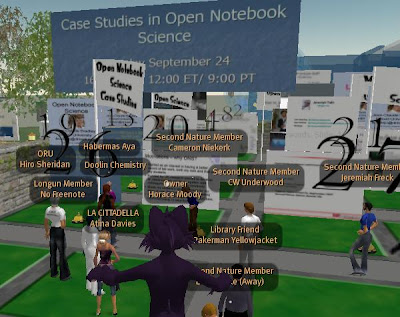Open Notebook Science Case Studies Session In Second Life
We had about a dozen participants at the Open Notebook Science Case Studies SciFoo Lives On session yesterday.
I talked about using a free and hosted blog (Blogger), wiki (Wikispaces), referral tracker (Sitemeter), mailing list (Google Groups), molecule database (ChemSpider) and raw data visualization (JSpecView) for managing UsefulChem.
Cameron Neylon described the use of blogs to track research in his group. In his approach each post is an object with a unique ID. His system will probably be more amenable to being read by automated agents and ultimately I would like to see something similar with the UsefulChem wiki experiment pages, although for the time being, we'll stick to freeform lab page entry that is easy to be read by humans. Cameron is now in the process of representing our experiment pages with his system and it will be interesting to see how it comes out. At the very least we are both learning from the exercise about how science is done and recorded in different fields by different researchers.
Jeremiah Faith also presented his system based on LaTeX. Jeremiah first used it privately to keep track of his research and then recently made it public. His lab notebook is now 400 pages. His advisor had no problem with letting him open his notebook to the world. It made me wonder if it would be worthwhile keeping a list of "Open Science Friendly" faculty on the SFLO wiki for students now looking for postdocs. I think there are probably several researchers who are not interested in actively pursuing some form of Open Science but would not have an objection to members of their group indulging in the practice.
Here is the transcript of the session.







Comments